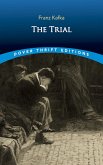Franz Kafka's "The Trial" is a haunting exploration of an individual's struggle against an opaque and often absurd legal system. Written in a distinctively surreal style, the narrative unfolds through the experiences of Josef K., an everyman thrust into a nightmarish world of arbitrary bureaucracy. The disorienting prose captures the essence of existential angst, reflecting the author's concern with themes of alienation, guilt, and the quest for meaning in a seemingly indifferent universe. The novel stands as a pivotal work of the early 20th century, resonating with the anxieties of modernity and the loss of personal agency in the face of relentless institutional power. Franz Kafka, born in Prague in 1883 to a middle-class Jewish family, often contended with feelings of inadequacy and isolation. These personal struggles, coupled with a profound engagement with philosophical ideas and contemporary socio-political issues, deeply informed his writing. Kafka's experiences of living in a bureaucratic society, alongside his own encounters with law and authority, shaped the nightmarish world depicted in "The Trial," making it not merely a critique of legal systems but also a profound reflection on the nature of existence. This novel is essential for readers seeking to delve into the complexities of modern existence and the intricacies of human rights within a flawed system. Kafka's incisive prose invites readers to question the nature of justice and their place in an often inexplicable world. As such, "The Trial" holds significant relevance today, urging readers to explore the profound anxieties of the human condition.
Dieser Download kann aus rechtlichen Gründen nur mit Rechnungsadresse in A, B, BG, CY, CZ, D, DK, EW, E, FIN, F, GR, H, IRL, I, LT, L, LR, M, NL, PL, P, R, S, SLO, SK ausgeliefert werden.









